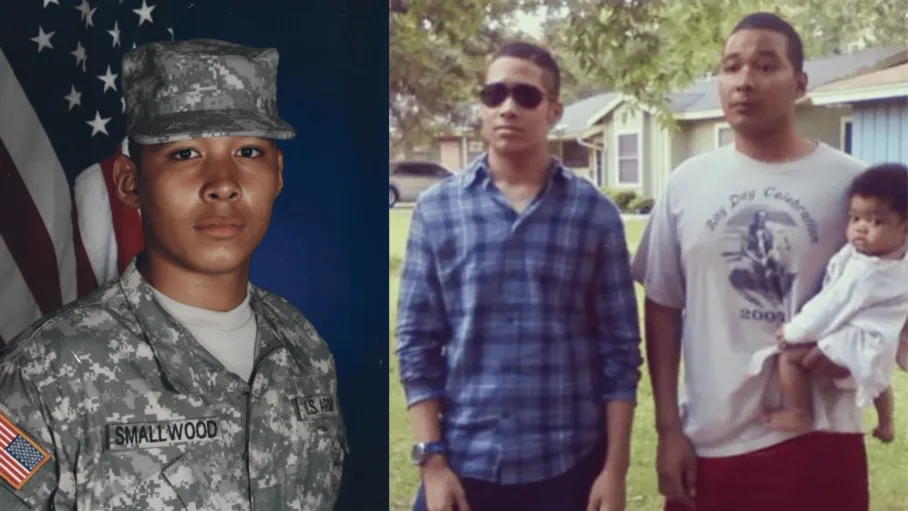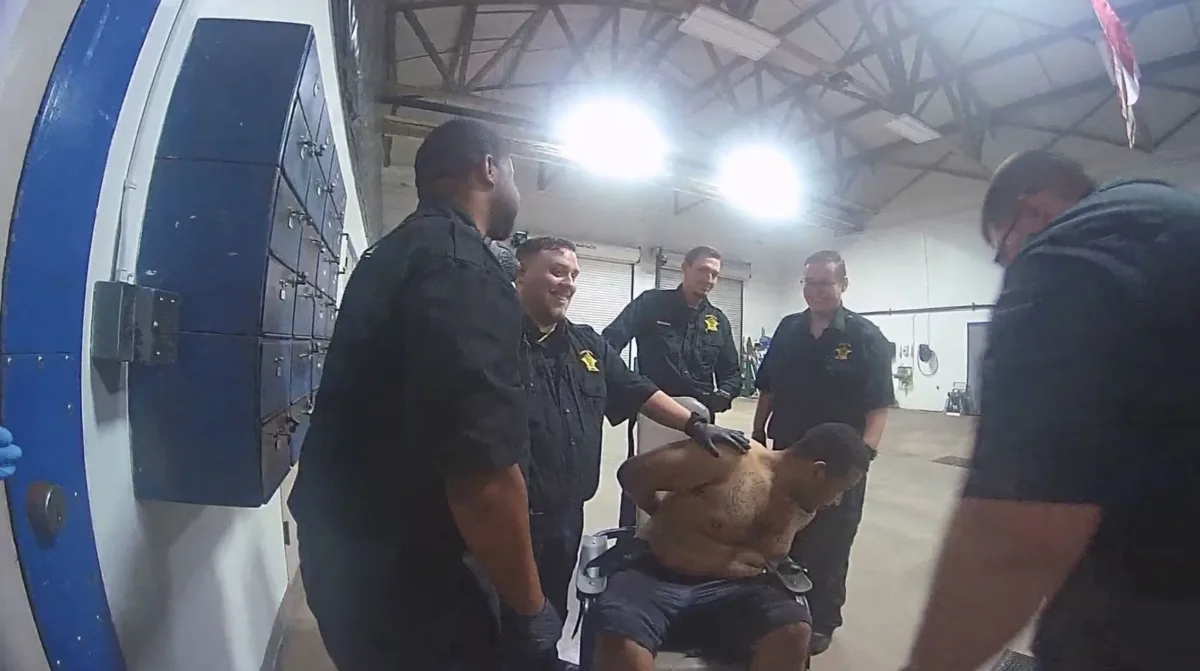Texas Jail Staff Laughed as Army Vet Choked and Died, Lawsuit Says
According to a wrongful death lawsuit, staff at the Angelina County Jail stood by as 33-year-old Glenn Smallwood vomited and died in front of them.

On the night of June 16, 2023, police officers in Lufkin, Texas, approached 33-year-old Glenn Smallwood. He was shirtless, on his hands and knees, and appeared to be scratching at something on the sidewalk.
“I’m a psych patient,” he told them, according to a wrongful death lawsuit Smallwood’s family filed Monday. Instead of taking him to a psychiatric facility, officers arrested him for public intoxication.
When they put the handcuffs on, he protested, but didn’t try to fight them.
“That went a lot better than I thought,” an officer says on the body cam footage. “Yeah. I thought he was going to put up a fight.” In the police car, Smallwood seemed to disassociate and hallucinate.
“Why did you do that?” he asked someone who wasn’t there. “Brah, you’re gonna kill me!”
The officers arrived at the Angelina County Jail and put Smallwood in a restraint chair, tightly fastening straps across his arms, legs, and torso. An investigation by KMBC 9 News found 109 deaths or serious injuries connected with the use of restraint chairs between 2014 and 2024.” According to KMBC 9, 102 people in 29 states died or were injured after the use of restraint chairs or full-body restraints.
Smallwood began to gag and vomit. He passed out, jolted awake only by more retching. He screamed and threw up as they wheeled him into a detox room. Officers kept him in a semi-prone position that might have impeded breathing or led to choking.
“I might throw up if I see that again, man, I can’t,” jokes one of the officers. They closed the door behind them. Hours later, he was dead.
Nine people have died in the jail since 2016, six of them between 2020 and 2024 alone. That’s in a jail with only 250 people in it on any given day.
At least two other people died in the same cell as Smallwood.

John Smallwood does not remember his brother as that man on all fours, picking at the sidewalk. Smallwood’s family is now suing Southern Health Partners (the jail’s private health care company), the Angelina County Sheriff’s Office, and two individuals involved that night. They did not respond to requests for comment.
“Glenn was more than his mistakes,” John told the Appeal. “He always helped others and shared his belongings. He tried to take care of everyone, even to his own detriment. He had a big heart.”
According to the suit, Glenn was a former member of the Army National Guard. John remembered how once, right after his brother came back from the service, a neighbor’s cat got stuck in a tree. Glenn didn’t hesitate to jump up after it.
“As Glenn climbed up, the cat climbed further up, and he climbed further up after it,” John said. “After saving the cat, I remember him giving her a hug because she was crying. I was so proud of him. I thought it was the coolest thing ever.”
But Glenn suffered from depression and schizophrenia that worsened over the years. Still, John says he was excited to remodel a house with his brother shortly before his death.
“He was so happy about the idea of working with me and turning his life around,” John said. “He was thinking positively about his future.”

According to the family’s lawsuit, a few minutes after staff moved Glenn to the jail’s detox room, a nurse with Southern Health Partners, a for-profit medical company, went in to assess his condition. She noticed that he’d lost consciousness and performed a sternum rub—a painful procedure meant to jar a patient awake and assess brain function. If a person doesn’t respond, it’s a sign they need immediate medical help. Smallwood remained unconscious.
Instead of calling 911, she grabbed smelling salts. Smallwood briefly jolted awake, but promptly passed out again. The nurse left. Over the next hour, officers discussed whether Smallwood would survive or was still breathing, but did not call for medical help or take him out of the chair.
Eventually, the police called the nurse back. By then, Smallwood was pale, unconscious, and taking shallow, labored breaths. One officer asked the nurse if they should take him to the hospital. She said no.
Twenty minutes later, the nurse looked at Smallwood through the window. He was no longer breathing. Instead of attempting to resuscitate him—or even going in the room—she left for the night. Fourteen minutes later, officers noticed that he wasn’t breathing and began chest compressions. By the time medics arrived, he had died.
Erik Heipt, the Smallwood family’s attorney, told The Appeal Glenn never should have been jailed in the first place.
“Glenn Smallwood was in a medical and mental health crisis,” he said. “He was not fit for confinement. He needed help, not jail.” Heipt called the restraint chair’s usage “draconian” and potentially lethal, adding that he feels the device “has no place in our modern society.”
Heipt further argues that the nurse’s incompetence stems from the company’s profit motive—they stationed a single, level-entry nurse at the jail. The lawsuit argues that she was not qualified to make the medical assessments that she made.
“This is the sort of atrocity that should never happen in an American jail, ever,” Heipt said. “There’s no excuse for it.”
In the years since his brother passed, John Smallwood hasn’t been able to stop thinking about his brother’s final few hours.
“They treated him worse than an animal, strapped him down in a chair, and let him suffer and die,” he said.
John thinks about the officers laughing and joking while his brother was choking, vomiting, and dying. He can’t understand why the nurse or officers didn’t call for medical help sooner. Or why she just went home when his brother was clearly in danger.
“My brother is not the first person to die in that jail,” John said. “I want to try to make sure he’s the last.
